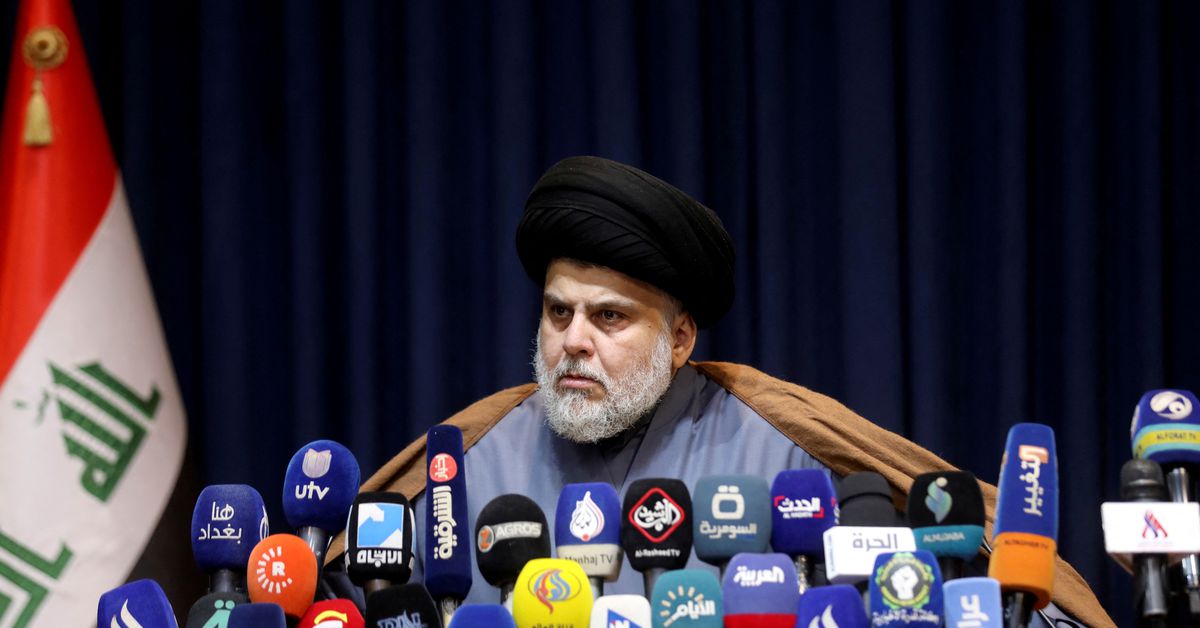Analysis: Sadr raises the stakes in struggle for Iraq

Summary Sadr MPs quit parliament
Move marks escalation of tussle with Iran-backed groups
Analyst doubts Iran-backed groups will form cabinet alone
Iran-allied politician calls for Sistani to intervene
BAGHD, June 14 (Reuters) – Moqtada al-Sadr has raised the stakes in the struggle for Iraq with a major political escalation that could lead to conflict with his Iran-backed rivals or force a compromise in their tussle over government.
Frustrated at being unable to form an administration eight months after his party won the biggest share of seats in parliament, the Shi’ite Muslim cleric steered Iraqi politics into uncharted territory on Sunday when his lawmakers quit. read more
The step points to a deepening struggle for influence in the Shi’ite community that has been ascendant since the U.S.-led invasion toppled Saddam Hussein two decades ago.
Register now for FREE unlimited access to Reuters.com Register
A serious challenge to the post-Saddam order, Sadr’s move has presented his Iran-backed rivals with a major dilemma.
In theory, they could now form an administration of their choosing to replace the outgoing government of Prime Minister Mustafa al-Kadhimi, who continues as caretaker.
But in reality, analysts say such a move would likely provoke unrest and even conflict with Sadr’s vast support base, which has previously taken up arms.
For Iran, the latest twist in Iraq’s political crisis is an unwelcome development, underlining intra-Shi’ite fissures that risk undermining its influence and playing to the advantage of its Gulf Arab adversaries.
Sadr, who has positioned himself as an opponent of U.S. and Iranian influence, has not detailed his reasons for quitting parliament. In a handwritten note, he described it as “a sacrifice” for the homeland.
Sadr’s Iran-backed opponents appear to be moving cautiously, well aware of his capacity to mobilise. They convened a meeting on Monday but announced no new decisions.
“We are caught off guard by Sadr’s surprising decision and we think a bad scenario is waiting for us in case we move ahead and form a government,” Ahmed Kinani, an Iran-aligned Shi’ite politician, told Reuters.
“We must read the recent, crucial development very carefully before deciding the next step, because forming a government without Sadrists will be a huge risk. We don’t want to be ambushed.”
DELOCK
Sadr has not declared his next move.
He has a track record of radical action, including fighting U.S. forces, quitting cabinets, and protesting against governments. Last year, he declared he would boycott the election, before reversing course. read more
“We are out of the political scene now, and let’s see how a new government will stand without Sadrists,” said a source at his office, speaking on the condition of anonymity because they were not authorised to make media statements.
Ihsan al-Shammari, head of the Iraqi Centre for Political Thought, did not expect Sadr’s rivals to form a government alone. “Such a government will be born dead because Sadr followers will not accept to see Moqtada broken and politically isolated by powers supported by Iran,” he said.
Heir to a clerical dynasty, Sadr shot to prominence after the invasion, establishing a force of fiercely loyal fighters that waged war on U.S. forces and later clashed with Iraqi authorities. read more
He has sought to set himself apart from Iran-backed rivals in recent years, emphasising his Iraqi nationalist credentials.
He has also installed many followers in state positions, whilst tapping public anger at the government’s corruption and failure to provide services despite Iraq’s oil wealth.
Iraq has been politically deadlocked since October’s election, in which Sadr won 73 of 329 seats and the Iran-backed factions – which retain militias – performed poorly.
Alleging vote rigging, Sadr’s opponents have thwarted his efforts to form a new administration with Kurdish and Sunni Arab allies.
Parliament has failed three times to elect a new president – reserved for a Kurd in Iraq’s power-sharing system – because a two-thirds quorum could not be secured. read more
Sadr’s efforts to form a new government excluding key Iranian allies have also gone nowhere.
CLERICAL INTERVENTION
Underlining intra-Shi’ite tensions since the vote, the residence of the Shi’ite Prime Minister Kadhimi came under drone attack in November. Iraqi officials and analysts have said the attack, from which Kadhimi escaped unhurt, was meant as a message by some of the Iran-backed groups. read more
Sharp divisions among Iran-backed groups on how to respond to Sadr’s move surfaced at Monday’s meeting, according to an attendee who spoke on the condition of anonymity because the proceedings were secret.
Following the meeting, Hadi al-Amiri, head of an Iran-backed militia, urged intervention by Grand Ayatollah Ali al-Sistani, Iraq’s top Shi’ite cleric, to save the situation.
Sistani, who rarely weighs in on politics except in times of crisis, holds massive influence in Shi’ite majority Iraq.
Hamdi Malik, an associate fellow at the Washington Institute, expected Iran would seek to calm the situation.
“What they don’t want to see happening is for the Shia to go to war with each other, and (avoiding) this is going to be their main effort at this stage,” he said.
“Iran thinks this will benefit others in the region, including the Arab Gulf states, allowing the Kurds to grow more powerful, and the Sunnis to strengthen their ties with Sunni states. So they do not want this current system … to collapse,” he said.
Sadr “knows his cards very well, and he is playing them, but in a completely radical manner”.
Register now for FREE unlimited access to Reuters.com Register
Additional reporting by Amina Ismail and Charlotte Bruneau in Baghdad and Tom Perry in Beirut; Writing by Tom Perry, Editing by William Maclean
Our Standards: The Thomson Reuters Trust Principles.






